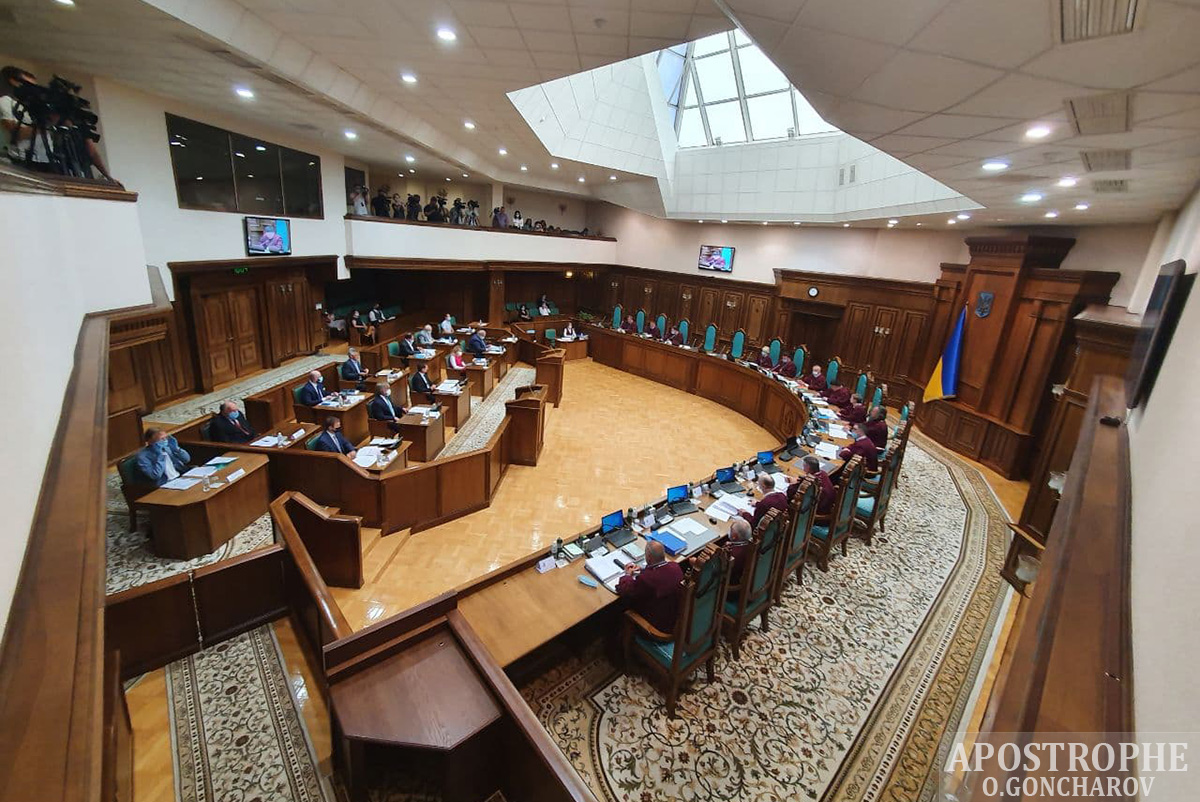The Constitutional Court’s decision to annul the system of e-declarations proved scandalous both in Ukraine and abroad. The ruling posed a palpable threat to Ukraine’s anti-corruption efforts, as well as to Kyiv’s relations with the EU. Nearly all key governmental bodies are currently searching for a solution to this crisis. Will Ukraine manage to restore the rule of law, at the same time avoiding EU sanctions?
Abolishing the E-Declarations System
On October 27, the Constitutional Court of Ukraine declared several provisions of state law on preventing corruption unconstitutional, at the same time canceling criminal accountability for the declaration of false information. The Constitutional Court’s ruling has practically deprived the National Agency on Corruption Prevention of its fundamental declaration-monitoring functions: verification of the information, lifestyle monitoring, checks for conflict of interest, etc.
According to the Constitutional Court, the e-declarations system “posed a threat” to judges’ impartiality by requiring them to declare their assets. As per their opinion, an executive body – and the National Agency on Corruption Prevention is an executive body – must not have the power to verify declarations of judges. It contradicts the separation of power concept.
An akin explanation did not reassure Ukrainian society, causing serious distrust in the system. In particular, it surfaced that several judges of the Constitutional Court – including its head Oleksandr Tupytsky – faced a conflict of interest in making the ruling. Investigative journalists discovered that Mr. Tupytsky failed to declare a piece of land in Crimea, which he had acquired in 2018. Moreover, the National Agency on Corruption Prevention has detected signs of declaring false information from two other judges of the Constitutional Court, Iryna Zavhorodna and Serhiy Holovaty.
Nevertheless, the main beneficiaries of the Constitutional Court’s scandalous decision are Viktor Medvedchuk and Ihor Kolomoisky; their MPs had strongly opposed the law on corruption prevention. Both oligarchs aim to undermine Ukraine’s cooperation with its international partners. As a long-term prospect, Medvedchuk and Kolomoisky wish to hinder the EU’s support for Ukraine’s Euro-Atlantic integration.
Consequences of the Constitutional Court’s Decision
The destruction of the e-declaration system poses significant risks to Ukraine. First, it provides for a several-year setback in the country’s anti-corruption efforts; despite the lack of effectiveness, the e-declaration system has been a backbone of Ukraine’s anti-corruption initiatives. The discrepancy between officials’ lifestyle and official income has been the easiest way to indicate and prosecute corruption suspicions. Moreover, free access to the e-declaration registrar allowed the public to hold officials accountable, which often proved more effective than governmental monitoring functions.
Additionally, the abolition of the e-declaration system palpably harms Ukraine’s relations with its international partners and, in particular, the EU. According to Mykola Tochytsky, Ukraine’s representative to the EU, an akin decision could pause further European integration processes, including integrating digital markets and the “industrial visa-free travel”. Ukraine is also concerned about the future of its visa-free regime with the EU.
With the Constitutional Court’s decision, the main loss is the growing distrust in Ukraine by European institutions. Anti-corruption efforts remain one of the most sensitive issues for Ukraine and the EU, and Kyiv has yet to demonstrate fruitful results in the matter. Moreover, the European Union continues to receive disturbing messages about constant political and oligarchic threats to Ukraine’s anti-corruption initiatives.
Volodymyr Zelensky’s Harsh Scenario
President Volodymyr Zelensky’s reaction to the scandalous decision of the Constitutional Court corresponded with the level of threat. The President held an urgent meeting of the National Security and Defense Council, treating the Court’s ruling as a national security threat. As a result, the Council decided there was a pressing need to develop bills that would promptly avert the crisis.
However, Zelensky’s legal proposal aimed at solving the crisis caused no fewer concerns than the original ruling. The president’s bill (№4288 “On restoring public trust in the constitutional judiciary”) provides for the opportunity to revoke the Constitutional Court’s decision, rendering it “futile”. President Zelensky’s legal initiative also stipulates that all judges of the Constitutional Court shall be dismissed. Ukraine would then announce a new competition to fill in their seat.
Evidently, Volodymyr Zelensky’s proposal has no legal ground, and hence cannot be implemented lawfully. President Zelesnky’s initiative calls on the Parliament to breach its power, falling short of usurpation. Neither the Servant of the People faction nor the opposition supported Zelensky’s plan. Moreover, the head of the Venice Commission Gianni Buquicchio and the president of the GRECO Marin Mrcel warned against an akin openly unconstitutional step.
It’s worth noting that the President’s Office proved to be the only body to call for the dissolution of the Constitutional Court with a parliamentary decision. One can assume that the President’s Office aimed to reload the “problematic” Constitutional Court relying on the situational legitimacy rather than the legality of the decision. With this, the President’s Office spread the sentiments in favor of a radical approach to the crisis, yet the plan failed without sufficient support. Speaker of the Verkhovna Rada Dmytro Razumkov did not support the President’s bill either, causing a new wave of tensions in his relations with the head of the President’s Office Andriy Yermak.
Ways of Combatting the Crisis
The annulment of the National Agency on Corruption Prevention’s fundamental functions, as well as President Zelensky’s radical scenario of combatting the crisis, led the Parliament to seek alternative solutions to the situation. On one hand, the Parliament has to reinstate the provisions of state law on corruption prevention that were deemed unconstitutional. On the other hand, it has to prevent new constitutional threats, as the Constitutional Court has lost the trust of Ukrainian society.
Thus, Speaker Razumkov suggested adopting the original version of the law “On Corruption Prevention” (2014) in the first reading, adapting it to the Constitutional Court requirements prior to the second hearing. Juxtaposing Zelensky’s radical scenario, Dmytro Razumkov’s initiative proved logical and unifying for the Parliament.
According to the MPs’ plan, parliamentary committees should have promptly approved the corresponding bill. Ignoring the president’s idea altogether, the Parliament focused solely on its own solutions. Right before the bill should have been considered in the first reading, it faced obstruction from a Kolomoisky-oriented MP, Oleksandr Dubinsky. Dubinsky registered an alternative bill, making it impossible to vote for Razumkov's bill as planned. One can expect Viktor Medvedchuk and Ihor Kolomoisky to continue blocking the initiative, likely introducing numerous amendments through loyal MPs. There is a risk that the Parliament will not be able to vote on the corruption prevention provisions in the nearest future.
An even more difficult task is regulating the activity of the Constitutional Court. The judges are heavily protected from interference in their work, at the same time enjoying immunity. President Zelensky referred to these legal provisions in his initiative, yet the Parliament selected a path of blocking the work of the Constitutional Court.
The need to block the work of the Constitutional Court arose out of fear that the Court might adopt another scandalous ruling. In particular, the judges were set to consider the land market, the system of individual deposits, and other highly important laws. According to the President, the judges of the Constitutional Court were not impartial in their ruling on e-declarations; thus, there is a risk of new biased decisions.
The Parliament has already developed several ways of dealing with the problem: first, increasing the quorum for making a ruling to 17 out of 18 votes of judges; second, adopting regulations regarding the powers and actions of the Constitutional Court. Meanwhile, the Parliament is blocking the work of the Constitutional Court. While it does prevent new scandalous rulings, it also significantly harms Ukrainian democracy.
It’s worth noting that both the President’s Office and the Parliament have called on the Constitutional Court judges to resign willingly. 226 MPs signed a corresponding appeal, yet only Judge Ihor Slidenko signed a resignation letter. Mr. Slidenko claimed he was pressured to resign by the President’s Office.
Interestingly, in seven full days, the Verkhovna Rada failed to approve a bill that would have solved the crisis. On one hand, Ihor Kolomoisky and Viktor Medvedchuk’s MPs are actively obstructing the decision-making process; on the other hand, there is a possibility that the Ukrainian government would prefer reaching an agreement with the Constitutional Court and other stakeholders more privately. At the same time, the situation yields some successes. In particular, the land market law was saved from the Court’s negative ruling. A day before announcing the verdict, Judge Serhiy Sas released a negative decision draft. According to the document, the Constitutional Court planned to require a national referendum before opening the land market. The release of Sas’s document prompted several judges to withdraw from the consideration; it won some time, yet it didn’t solve the problem.
Where does that leave us?
The Constitutional Court’s scandalous decision to annul the system of e-declarations could entail far more serious consequences than the loss of corresponding legislation or the aggravation of Ukraine’s relations with its international partners.
The situation at hand has illustrated the depth of the crisis in the rule of law in Ukraine. Ukrainian judges constitute a separate societal group, which abuses its power for personal benefit. The group involves both regular judges and judges of the Constitutional Court. Ukrainian society has numerously borne witness to the Constitutional Court making political decisions, interpreting legal norms in its favor. Akin political decisions allowed Volodymyr Zelensky to dissolute the Parliament of the 8th convocation, thus leading the president’s “mono-majority” to power.
Moreover, the government’s desire to respond to a constitutional crisis with anti-constitutional measures is concerning. Primarily, it signifies the inability to find a solution within a legal framework. Secondly, the dissolution of the Constitutional Court with a parliamentary decision would provide for a negative precedent to be used in the future.
Undoubtedly, the beneficiaries of the scandalous ruling – Ihor Kolomoisky and Viktor Medvedchuk – have already reached their goal. Both oligarchs are far more interested in crises than in the abolition of the e-declarations system. Their ultimate goal is disseminating the idea that Ukraine is a failed state, thus hindering Ukraine’s global positions.





